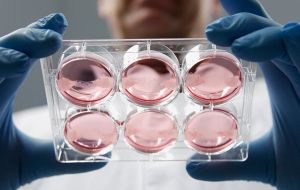MercoPress. South Atlantic News Agency
Dutch scientists planning first lab-grown hamburger later this year
 It’s made out of stem cells and could cost £ 200.000
It’s made out of stem cells and could cost £ 200.000 Dutch scientists have used stem cells to create strips of muscle tissue with the aim of producing the first lab-grown hamburger later this year. The aim of the research is to develop a more efficient way of producing meat than rearing animals.
At a major science meeting in Canada, Prof Mark Post said synthetic meat could reduce the environmental footprint of meat by up to 60%.
“We would gain a tremendous amount in terms of resources,” he said.
Professor Post's group at Maastricht University in the Netherlands has grown small pieces of muscle about 2cm long, 1cm wide and about mm thick.
They are off-white and resemble strips of calamari in appearance. These strips will be mixed with blood and artificially grown fat to produce a hamburger by the autumn.
The cost of producing the hamburger will be £200,000 but Professor Post says that once the principle has been demonstrated, production techniques will be improved and costs will come down.
At a news conference, Prof Post said he was even planning to ask celebrity chef Heston Blumenthal to cook it. “The reason we are doing this is not to show a viable product but to show that in reality we can do this,” he told BBC News.
“From then on, we need to spend a whole lot of work and money to make the process efficient and then cost effective.”
So why use such high tech methods to produce meat when livestock production methods have done the job effectively for thousands of years?
It is because most food scientists believe that current methods of food production are unsustainable.
Some estimate that food production will have to double within the next 50 years to meet the requirements of a growing population. During this period, climate change, water shortages and greater urbanisation will make it more difficult to produce food.
Prof Sean Smukler from the University of British Columbia said keeping pace with demand for meat from Asia and Africa will be particularly hard as demand from these regions will shoot up as living standards rise. He thinks that lab grown meat could be a good solution.
Demand for meat will increase at a time when it will be harder than ever for farmers to boost production
“It will help reduce land pressures,” he told BBC News. “Anything that stops more wild land being converted to agricultural land is a good thing. We're already reaching a critical point in availability of arable land,” he said.
Lab-grown meat could eventually become more efficient than producing meat the old fashioned way, according to Prof Post. Currently, 100g of vegetable protein has to be fed to pigs or cows to produce 15g of animal protein, an efficiency of 15%. He believes that synthetic meat could be produced with an equivalent energy efficiency of 50%.
So what is the synthetic burger likely to taste like?
“In the beginning it will taste bland,” says Prof Post. “I think we will need to work on the flavour separately by trying to figure out which components of the meat actually produce the taste and analyse what the composition of the strip is and whether we can change that.”
Prof Post also said that if the technology took off, it would reduce the number of animals that were factory farmed and slaughtered. (BBC).-




Top Comments
Disclaimer & comment rules-

-

-

Read all comments“It is because most food scientists believe that current methods of food production are unsustainable.”
Feb 21st, 2012 - 05:51 am 0No, noh, it is because the most sick twisted mad scientists believe that current methods of food production doesn't fit in their agenda to rid of as manyof people on this planet, shut down agriculture businesses in the name of “saving mother gaia”.
Just sounds wrong, i don't know why.
Feb 21st, 2012 - 05:22 pm 0I work in the food industry and I hate to see this!
Feb 24th, 2012 - 09:45 am 0The only future a “product” like this has is that it will be controlled by massive corporations just like Genetically Modified substances!
I think I will stick to growing my own veg and keeping chickens! Makes the 'Good Life' look better than ever.
Commenting for this story is now closed.
If you have a Facebook account, become a fan and comment on our Facebook Page!